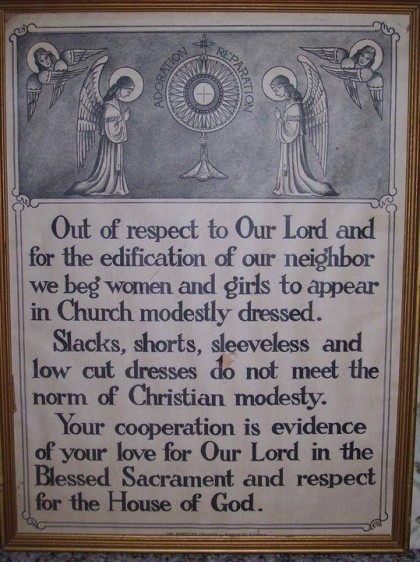Why is sex sacred?
Katie van Schaijik | Jul 9, 2019
Reflecting on one of the talks about the sacredness of sexuality at the ToB conference last month, something clicked for me.
The speaker said he always begins his presentations of ToB to today's young people by pointing out what they already know from experience and intuition: Sexual abuse is the worst kind of harm you can do a person. It violates him in a way punching him or stealing his wallet, say, doesn't. Somehow, sex is linked to who we are, deeply and intimately. So, it makes sense to surround it with protections. I loved that.
I was more ambivalent about other parts of the talk, though I couldn't at first say exactly why. Part of it had to do with modesty—how women wearing a dress, for instance, is a way of indicating the sacredness of sexuality.
I've heard this before of course, and I don't disagree. But I balked even so. An image a friend had shared on Facebook a while back came to mind. It's apparently from an old church vestibule. (I'm guessing pre-Vatican II.)

It makes my skin crawl and my blood boil. It's controlling and manipulative and misogynistic.
1) What about men and boys? Is it only females whose manner of dress affects their neighbor or exposes the state of their souls? Men can wear whatever they like?
2) Who is the priest (or whoever composed and hung the sign) to publicly announce what a woman's dress signifies? How does he know why she picked the outfit she picked that day? Maybe it was reverence for the Eucharist or concern for her neighbor. But maybe it was nothing nobler than convention or habit. Maybe it was fear of being judged. Maybe she's showing off a new outfit. Maybe it was the only clean thing in her closet. Maybe a particular woman is immodestly dressed because she's been sitting at a sick person's bedside all night and had no time to change before mass. Or maybe she's just had a conversion and never gave a thought to her clothes. She's only thinking of getting to church be close to God. We have no idea, do we?
3) Everyone who reads that sign is practically being instructed to judge the women who come through the door by their clothes and to shame those who don't meet this priest's standard of Christian modesty.
Not okay, not okay, not okay! I don't care how eloquently and truly you can wax about the sacredness of sexuality and the symbolism of the veil, if you're judging women by their clothes, you are doing something worse than dressing immodestly, you're objectifying persons, you're operating in the master/slave mode, which is the opposite of love, the opposite of ToB. I've written about this before, including here and here.
The speaker who sparked this train of thought didn't say anything like as egregious as that sign, but neither did say anything to counteract it either. I mean, he said nothing to show he was aware of and sensitive to the fact that there might be a personalistic problem with modesty norms and/or good personalist reasons for the reaction against them today—reasons rooted exactly in a sense of the dignity of the person.
At another point in the talk, the speaker mentioned St. Maria Goretti as an example of someone who was so committed to the sacredness of sex that she preferred to die than violate it. That reminded me of a article of Simcha Fisher's. "Maria Goretti didn't die for her virginity."
Over and over, I’ve heard this saint praised as a holy girl who prized her virginity so highly that she was willing to die to defend it. And she did die as a result of defending her virginity. But when her would-be rapist attacked her, she pleaded with him to stop because he would be committing a mortal sin, and he would go to hell. She didn’t say, “Please, please, spare my virginity!” She begged him to spare himself.
Sex is sacred because persons are sacred, and sexuality is the most intimate aspect of a person. It's where both our potential for the mutual self-giving of love and our vulnerability to abuse are most completely embodied.
Whenever we scorn persons for immodest dress, we are radically contradicting ourselves. If we try to manipulate or force or shame women into complying with our norms for their behavior, we're being much more sacrilegious than she is being with her clothes, or her lack of clothes.
If we want to see a rebirth of reverence for sexuality in our society, let's begin by cultivating reverence for persons in ourselves.
